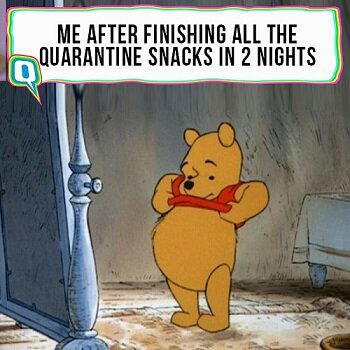What To Do About Over-snacking
Excessive snacking can be stressful at the best of times, now that we have been stuck at home the problem is exaggerated. Throw in feelings of guilt, and it's easy to get into a bit of a vicious cycle.
Snacking in itself is not necessarily bad, but snacking when you’re not hungry or snack on the unhealthy foods can lead to unnecessary weight gain as well as increased lethargy.
According to the Heart Foundation, one-third of the Australians in their survey believe that their eating habits have worsened since the coronavirus lockdown, with over half reporting putting on weight. Deliveroo reportedly put out some stats on their orders, showing a 597% increase in fish and chips and 139% increase in icecream orders.
In positive news, there was another third of Australians who presumedly changed their diet for the better!
Why we are lockdown-snacking
Because we can
Being stuck at home allows more frequent access to the fridge and pantry, as well as perhaps more access to unhealthier food behaviours behind closed doors.
It may be easier to opt the poorer food choice, without the support from your friends and colleagues sharing in delicious, healthy, food and making the wait for it bearable if it’s being prepared fresh.
Stress
Eating to manage stress, is not uncommon. In fact, the Australian Psychological Society Stress and Wellbeing in Australia survey (2015) found that 72% of the respondents use eating as a way to manage stress. Stress has increased for many people at the recently so it’s no wonder stress-eating has as well.
Mindless eating
Eating and working from home can also support an environment of multitasking and mindless eating. Mindless eating is the concept of eating without paying much attention, and often when you are not hungry. This leads to eating faster and more before the satiety signals can kick in. Economist Dr Brian Wansink wrote a whole book on it, and has some great resources on his website.
Kick it in the butt now
It is easier to form healthier habits when you are less stressed, or, if the change is really important to you. It’s hard to reliably predict when you will be more stressed, but with a return to commuting and another adjustment to routine, there is a risk of stress increasing as we return to normal life.
Therefore, it might be a better time, now, to get into good habits while you can.
If snacking is something you want to change, as per our Habit Changing article, to have a think about why you want to change it and how to support yourself in the change.
Tips to improve snacking habits
In regards to The How, our Dietitian Chantelle Wardini put together some tips to reduce mindless snacking.
Eat more regularly to avoid becoming too hungry and overindulging on “quick” snacks
Create a routine for your day including schedule of your meal times
Only eat at the dinner table or in a designated “eating place” - not where you’re working!
When you dish up your meal, also put away any leftovers in a container and freeze or refrigerate to avoid going back for seconds. If you are still hungry after you have taken the time to reheat the meal, then go for it! But, remember to keep checking in with your hunger levels as you eat it! This will help you to prevent overeating and create more mindful eating habits by encouraging a check-in at the end of the meal before going back for more.
Limit stocking the foods you tend to snack on excessively or overeat e.g. chips or chocolate
Eat from a bowl, not a packet, this way you can see how much food you are eating, and will also allow you to listen to your body’s cues. Check-in with yourself after each portion to decide if you are full or are still feeling hungry before you add more
Try a drink of water or tea first you might be thirsty, not hungry
Do a 3 minutes+ exercise or something else. Sometimes we’re not hungry, we just need a work break and some movement!
Try to recognise if you’re stressed, bored, need a break, or genuinely need some fuel
Healthy Snacks
Like we said, snacking in itself isn’t bad.
But if you need to snack, try to snack, try the healthier options. They will provide longer energy as well as have less impact on the waistline.
Fruit
Nuts
Vegetable dips
Yoghurt
Celery or apple with peanut butter
Chia pudding
Hard boiled eggs
Edamame
Canned salmon or sardines
Olives, pickles
If you’re struggling with this and need more help, it’s a good idea to find a local Dietitian or Psychologist that specialises in supporting eating behaviours.
Good luck and stay well!
Authors: Chantelle Wardini & Biara Webster








